24 May 2022 | Non categorizzato
Loving others by generating good, going beyond the objective limits that life imposes on us, beyond our prejudices, breaking down barriers to build fraternal bonds. This is the mandate of Jesus’ New Commandment, the hallmark of a Christian: reciprocity in love. Two pancakes We are two Christian newlyweds, and we don’t have much. Not long ago we learned that a girl from Burundi, who was also poor, had planted a tree and was harvesting its fruit to help the hungry. It had never occurred to us that we could do anything for the destitute: our family’s income barely covers our outgoings each month, so we were always waiting for the day when we would have something “superfluous” to give. But that girl’s example was moving; it encouraged us to set aside the proceeds from the sale of two pancakes a day, since we run a small shop in our neighbourhood. Now at the end of each month we always have a small fund for others, and although it is a small thing, this act of love helps us act more carefully as well. Someone who learned about our experience remarked that this gesture is like the widow’s offering from the Gospels. Yes, it is, and we are very happy about it. J. O., Kenya A floral tribute In our village there are few pharmacies. I did not like to go to the one closest to home, because the pharmacist was grumpy and always seemed angry. Since I was not the only one who had this negative impression, I decided not to go to that pharmacy anymore. But one Sunday at Mass, listening to the priest talk about loving our enemies, the pharmacist came to mind. Knowing her name, I took advantage of her feast day to bring her flowers. With that simple gesture, she was moved, revealing an unusual friendliness. For me it confirmed of the words of St. John of the Cross: “Where there is no love, put love and you will find love.” It’s an evangelical law that applies to every situation. After those flowers to the pharmacist, whatever difficult situation arises, I put that saint’s motto into practice, and it’s sure to have an effect. Even my children now know that to overcome difficulties in relationships it takes more love, and it is good to tell each other about these small or big daily victories. K., Serbia With open arms My husband is Catholic, I am Evangelical. We have learned to accept each other in our diversity. When our daughter was baptized in the Catholic Church, the Lutheran pastor was also present. Ever since then a friendship was born between the two pastors that has led to several initiatives: common prayers, peace rallies, a service for visiting the sick… I am responsible for ecumenical activities in my parish council, and out of love for the Catholic parish I also devote time to raising funds for Caritas. Since the opening of a reception centre for political refugees (mostly Muslims from Tunisia, Libya, Romania, Bosnia and Kosovo), collaboration between Catholic, Evangelical and Orthodox Christians has intensified. A couple of Romanian friends who left for their country temporarily entrusted their daughter to us, and in addition we “adopted” a Muslim family in need. Making others’ needs our own is a real asset to our family. Edith, Germany
Edited by Maria Grazia Berretta
From “Il Vangelo del Giorno”, Città Nuova, Year VIII, No. 2, May–June 2022.
23 May 2022 | Non categorizzato
In this text, Chiara Lubich tells how the pact of mutual love with her first companions led them to experience the presence of Jesus in their midst. We too can have the same experience on condition that mutual love is the foundation. “On one occasion, … I was asked how we understood for the first time that Jesus was present in the midst of two or more united in his name. To answer this question in complete faithfulness to the Holy Spirit, I began by describing what came before that in our history. It was when, for example, we might have been killed by the bombings at any time and we, first focolarine, asked ourselves if there was a will of God that was especially pleasing to him so that we could live it at least during the last days of our life. I spoke of how Jesus’ new commandment was the answer – the commandment of mutual love, based on the measure of the love of Jesus, who gave his life for us. I spoke about the pact that followed: “I am ready to die for you,” “I am ready to die for you,” but then, of course, I explained at length what happened afterwards. Do you remember? We felt that our life had taken a qualitative leap forward, as if a net had lifted us higher; and for the first time, we experienced a peace we had never felt before. This is what we said and what we always say. We experienced a light that gave full meaning to all that concerned us. We had a new and steadfast will in the place of our own which was often so inconsistent in keeping resolutions. We felt a fresh, rare, effervescent joy, and a new, very lively, ardour and zeal… I explained how we had wondered, in those moments, what might have been the cause of all this. And how we understood that, in that moment, Jesus had come into our midst spiritually because we were united in his name, that is, in his love. Our peace, light, ardour, and joy, and so on, were signs of this. In fact, when he is present, there are all these effects; otherwise, there’s no point in fooling ourselves, he is not present. Therefore, I concluded, we understood that he was in our midst when we were able to experience his presence. In fact, believing in his presence isn’t only a matter of faith, believing because he said so. No, if Jesus is among us, we feel that he is present. We can experience this. This is what is so beautiful and great about this particular presence of his, to which we are called.”
Chiara Lubich
(Chiara Lubich, Conversazioni, Città Nuova, 2019, pp. 580/1)
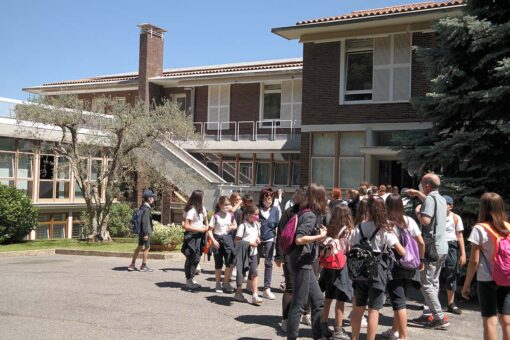
21 May 2022 | Non categorizzato
The prizes and some commendations for the Schools Competition, held for the second time, have been awarded. This year over 3,000 students from 144 classes took part. On Thursday, 19th May, the award ceremony for the Italian National Competition “One city is not enough, Chiara Lubich Citizen of the world” was held for the second time. The Competition was organized by the Chiara Lubich Centre in collaboration with the Italian Ministry of Education, the Historical Museum Foundation of Trent and the Focolare’s New Humanity Movement.
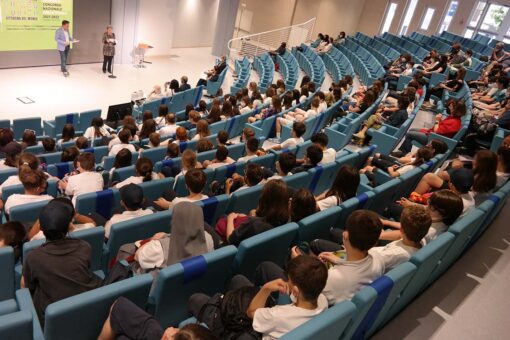
© CSC Audiovisivi
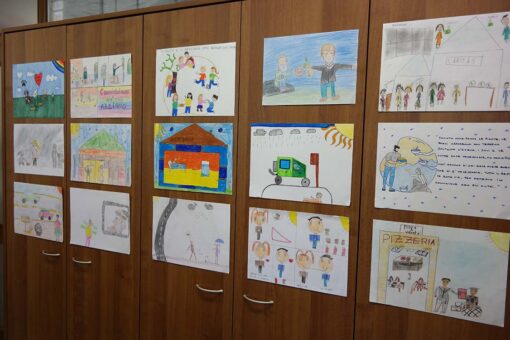
© CSC Audiovisivi

© CSC Audiovisivi
Lorenzo Russo
19 May 2022 | Centro internazionale, Non categorizzato, Tutela minori
Significant steps forward are being taken to expand and strengthen measures concerning prevention, training, compensation, and the assessment of responsibility. These will guarantee justice to all victims and implement a culture in which absolute priority is given to charity, to the dignity of the person, and to safety and transparency in all areas of the Movement. “Today we are publishing a first response to the recommendations made by the Report issued by GCPS Consulting on the cases of child abuse by a former member of the Focolare Movement in France. We realise that these initial measures are not exhaustive, but form part of a decisive process of realignment of the life and activities of the Movement so that children and every person, in all their diversity, are at the centre of all processes concerning care, safeguarding, reparation and new beginnings“. With these words Margaret Karram, President of the Focolare Movement, presented the steps the Movement is now taking, thanks also to the recommendations made by GCPS Consulting. These measures are in addition to the Guidelines for the Safeguarding of Children and Vulnerable Adults (being followed in the Focolare Movement since 2014 and currently being revised according to international standards) and to the training courses on safeguarding for members of the Movement. “First and foremost,” she explained, “I wish to address all victims of sexual abuse, particularly in France. Personally and on behalf of the Movement I wish to thank you for your courage in sharing your testimony and your pain. For us they are the essential starting point in this process of purification. I also wish to thank the community of the Movement in France for its courage in the face of so much suffering. We now announce the establishment of a central disciplinary commission, which will have the task of assessing the responsibilities of the Movement’s leadership, in cases of abuse, in order to reach clarity and provide justice for the victims. Margaret Karram concluded, “First and foremost we are placing the Gospel at the basis of this process of renewal. We want to put the Gospel back at the centre of all we do. Moreover, the serious challenges that the world is experiencing today call for a renewed application of the spirituality of unity so that it can be an instrument of fraternity and peace.” The measures set out below will be implemented over the short, medium, and long term and are considered the most urgent and essential steps to set the Movement firmly on a path of reparation and positive new beginnings.
- Victims at the centre: the President’s personal request for forgiveness
The victims of abuse are the absolute priority in this process. Therefore, listening, asking for forgiveness, offering help and the path of reparation are the starting point. Margaret Karram has been in contact personally, when possible while respecting their privacy, with the victims in France. Her wish is to reach them all, while respecting those who wish to remain anonymous. A network for welcoming and listening to victims Local commissions for the welfare and safeguarding of children and vulnerable adults will be strengthened (where they already exist) or be set up wherever necessary and will include professionals in the fields of psychology, law, training, and education. These commissions are independent of the governance bodies of the Focolare Movement and will be the point of contact for allegations of abuse and have the task of initiating procedures. The local commissions will also serve as listening points and the first port of call for anyone wishing to share their experience of abuse, violence, distress, or traumatic experiences of any kind, also accessing – if requested – counselling to identify the next steps. In this respect, listening points are already active in some countries, such as France and Germany.
- Drawing up a protocol for the compensation of victims of abuse committed within the Focolare Movement
A Focolare Movement procedure for compensating victims is being drawn up.
- Establishment of a disciplinary commission
A central disciplinary commission will be established, made up for the most part of external professionals in the fields of law and psychology, to assess the responsibility of the leadership of the Focolare Movement in dealing with sexual abuse, spiritual abuse, and the abuse of authority. It will work on the basis of a disciplinary code, which will be drawn up in agreement with the Commission itself, and will establish ethical principles and sanctions.
- Publication of an annual report in the whole world
A report on the work carried out by the Central Commission for the Welfare and Safeguarding of Children and Vulnerable Adults (CO.BE.TU) on cases of abuse and on measures taken regarding prevention, and on the safeguarding of children, will be published annually.
- Safeguarding is the responsibility of all the Movement’s members
To strengthen this awareness, the Movement will enable every member, including children and those who wish to become members, to attend a foundation course on the safeguarding of children and vulnerable adults, organised by the local commissions for the welfare and safeguarding of children and vulnerable adults.
- Training courses for those in leadership roles
Courses are being prepared to train those in leadership roles – at whatever level they work – to implement forms of co-responsibility, greater transparency in decision-making processes, the alternating of roles, and training in accompaniment in the light of the distinction between the sphere of governance and the sphere of conscience.
- Opportunities for sharing and courses for the Focolare Movement’s wider communities
The wider Focolare communities in various localities should enable the necessary processes of discernment, open dialogue, and an understanding of correct relational dynamics. Following the publication of the Independent Inquiry by GCPS Consulting, many of the Movement’s groups and communities have already begun to have times of sharing and dialogue on issues regarding abuses. The Movement encourages such initiatives with the support of experts and professionals, where necessary or requested, taking into account different cultural sensitivities.
Stefania Tanesini
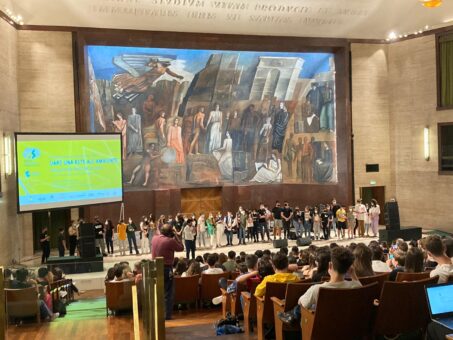
18 May 2022 | Non categorizzato
The culmination of a whole year’s activity for the planet, the “A Network for the Environment” event in May 2022, welcomed a hall full of students, together with other colleagues linked online around the world.  Over 500 youth filled the splendid Aula Magna of Rome’s ‘Sapienza’ University on Friday 13 May 2022, to celebrate the conclusion of this academic year’s (2021-22) action for the “A Network to Protect the Environment” project. 10 institutes of higher education in the Lazio region of Italy sent representatives, with many other students from different parts of Italy and the world participating online, to review the fruits of their combined efforts. Throughout the year no less than 8,000 students from 89 schools in Italy and 12 other countries, accessed formation in energy saving. They were invited to sign a pact and 200 actions of personal energy saving were recorded. These actions were sponsored by relatives (at 0.10 cents per action), through the DPSAR App, raising money for several solidarity projects in areas of poverty and environmental damage due to climate change. A planetary perspective prompted by simple daily life. We spoke to project coordinator Andrea Conte, a specialist in Astrophysics and teacher of Mathematics and Physics at the Liceo Classico of Pescara, Italy. What do you mean by a “network” for the environment? This program of formation in environmental protection was first developed in Rome in 2008 by educationalist Elena Pace, a member of the Nuove Vie per un Mondo Unito (New Ways for a United World) Association. The original name of the project was “Giving to Protect the Environment” The introduction of the word “network” came about in 2019 and helped take the project to the next level. Each individual class continues to organize activities but is no longer on its own. Each pupil, with their classmates and the support of their family members, continues to act in favour of the Earth, but is now part of a network of many schools doing the same thing. We began by linking up schools within Italy and this network is already spreading beyond. Has radical change been brought about by any of these actions? The natural creativity of the students makes itself felt. One school in Rome, Italy, for example, decided to completely exclude the use of plastic bottles. But they opted for a scientific method to achieve this goal by inventing a form of “plasticometer” to weigh all the single-use plastic in the school. And every time someone discarded an empty plastic bottle, they made a commitment to use a re-usable water bottle or flask in future. Almost immediately they noticed a reduction in the weight of plastic waste, and in a remarkably short time it was reduced to zero. A real revolution. Why do you think interest in ecology is growing amongst today’s youth? Ecology is not something new. Climate change has been talked about for decades. But today’s youth are feeling the effects of a society in continual evolution and are noticing the need to act decisively. As well as continual bad news about the worsening situation, there is also increased awareness, as seen in projects run by local administrations, by individual citizens, by schools etc. Through this, our sense of citizenship grows, the desire to be well-informed and active in helping our own planet to become a healthier place. What is your main message to students today? I am lucky enough to teach a subject I am passionate about and in which I believe. This is truly a great gift. When I was at high school, there weren’t the same resourses available as now, and I’m happy to be able to introduce them to my students. I myself only began to realise the challenges our planet is suffering when I was in university studying astronomy and astrophysics. When you’re detached from the earth’s surface and turn your gaze to the universe out there, it’s then you contemplate the fragility of the Earth. So I always make this comparison to my students, telling them it’s when we detach ourselves from ourselves and turn towards the others that we truly realise how much each of us has to give, each one in our diversity.
Over 500 youth filled the splendid Aula Magna of Rome’s ‘Sapienza’ University on Friday 13 May 2022, to celebrate the conclusion of this academic year’s (2021-22) action for the “A Network to Protect the Environment” project. 10 institutes of higher education in the Lazio region of Italy sent representatives, with many other students from different parts of Italy and the world participating online, to review the fruits of their combined efforts. Throughout the year no less than 8,000 students from 89 schools in Italy and 12 other countries, accessed formation in energy saving. They were invited to sign a pact and 200 actions of personal energy saving were recorded. These actions were sponsored by relatives (at 0.10 cents per action), through the DPSAR App, raising money for several solidarity projects in areas of poverty and environmental damage due to climate change. A planetary perspective prompted by simple daily life. We spoke to project coordinator Andrea Conte, a specialist in Astrophysics and teacher of Mathematics and Physics at the Liceo Classico of Pescara, Italy. What do you mean by a “network” for the environment? This program of formation in environmental protection was first developed in Rome in 2008 by educationalist Elena Pace, a member of the Nuove Vie per un Mondo Unito (New Ways for a United World) Association. The original name of the project was “Giving to Protect the Environment” The introduction of the word “network” came about in 2019 and helped take the project to the next level. Each individual class continues to organize activities but is no longer on its own. Each pupil, with their classmates and the support of their family members, continues to act in favour of the Earth, but is now part of a network of many schools doing the same thing. We began by linking up schools within Italy and this network is already spreading beyond. Has radical change been brought about by any of these actions? The natural creativity of the students makes itself felt. One school in Rome, Italy, for example, decided to completely exclude the use of plastic bottles. But they opted for a scientific method to achieve this goal by inventing a form of “plasticometer” to weigh all the single-use plastic in the school. And every time someone discarded an empty plastic bottle, they made a commitment to use a re-usable water bottle or flask in future. Almost immediately they noticed a reduction in the weight of plastic waste, and in a remarkably short time it was reduced to zero. A real revolution. Why do you think interest in ecology is growing amongst today’s youth? Ecology is not something new. Climate change has been talked about for decades. But today’s youth are feeling the effects of a society in continual evolution and are noticing the need to act decisively. As well as continual bad news about the worsening situation, there is also increased awareness, as seen in projects run by local administrations, by individual citizens, by schools etc. Through this, our sense of citizenship grows, the desire to be well-informed and active in helping our own planet to become a healthier place. What is your main message to students today? I am lucky enough to teach a subject I am passionate about and in which I believe. This is truly a great gift. When I was at high school, there weren’t the same resourses available as now, and I’m happy to be able to introduce them to my students. I myself only began to realise the challenges our planet is suffering when I was in university studying astronomy and astrophysics. When you’re detached from the earth’s surface and turn your gaze to the universe out there, it’s then you contemplate the fragility of the Earth. So I always make this comparison to my students, telling them it’s when we detach ourselves from ourselves and turn towards the others that we truly realise how much each of us has to give, each one in our diversity.
Maria Grazia Berretta
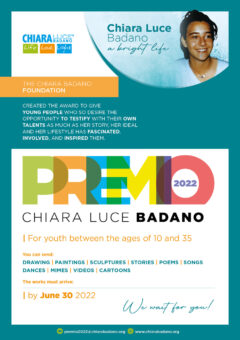
17 May 2022 | Non categorizzato
A youth competition dedicated to the young girl from Sassello, Italy, beatified in 2010. The jury, headed by Chiara Luce’s mother, Maria Teresa Badano, will vote on artistic submissions in two age categories: 10-16 years and 17-35 years. The award ceremony will be held on 29 October in Sassello.  Applications are open for the Chiara Luce Badano Prize, dedicated to the young girl from Sassello, Italy who was beatified in 2010. The competition invites young people from 10 to 35 years of age, to express through the arts how they have been inspired by encountering Chiara Luce, whose brief life is an example to thousands of young people around the world today. A young woman in love with God. Chiara Luce Badano was 17 when she was diagnosed with a bone tumour, but the infinite love for God was stronger for her. “For you, Jesus. If you want it, I want it too!” She got to know the Focolare Movement while still in primary school, and became one of the Gen (young generation of the Focolare Movement). She didn’t so much speak about Jesus to others, as communicate Him with her life. She used to say, “I don’t need to speak about Jesus, but I must give Jesus through how I behave”. She had received a letter from Focolare founder, Chiara Lubich, proposing, ‘Chiara Luce is the name I thought of for you. Do you like it? It is the light of the Ideal that conquers the world…’ Chiara Luce left this earth on 7 October 1990, at the age of 19, with these last words, “Be happy, Mamma, because I am”, the culmination of suffering lived in the radiant light of faith. In 2018 the Chiara Badano Foundation unveiled the “Chiara Luce Badano Prize”, to promote artistic works inspired by the life and existential model of Chiara Luce, in order to sustain and spread awareness of who she is and her story, and propose her as a model of life for many other young people. Young artists can express all their creativity through visual arts, poetry, story-telling, songs, dance and other forms. All entries must reach the jury by 30 June, as indicated by the rules and directions contained in the prize regulations. The highly qualified jury members, headed by mamma Maria Teresa Badano, will vote on two age categories: 10-16 years and 17-35 years. The 2022 prize will be awarded on 29 October in Sassello during the annual liturgical celebration, when the winning artistic work will be displayed or performed. Full information on the Prize is available on the Chiara Badano Foundation website, where you can also find details of the life of Chiara Luce, known around the world, through video, witness testimonies and photographs. There is a detailed list of the ever growing number of publications covering her life and the Ideal of Chiara Lubich which Blessed Chiara Luce made her own.
Applications are open for the Chiara Luce Badano Prize, dedicated to the young girl from Sassello, Italy who was beatified in 2010. The competition invites young people from 10 to 35 years of age, to express through the arts how they have been inspired by encountering Chiara Luce, whose brief life is an example to thousands of young people around the world today. A young woman in love with God. Chiara Luce Badano was 17 when she was diagnosed with a bone tumour, but the infinite love for God was stronger for her. “For you, Jesus. If you want it, I want it too!” She got to know the Focolare Movement while still in primary school, and became one of the Gen (young generation of the Focolare Movement). She didn’t so much speak about Jesus to others, as communicate Him with her life. She used to say, “I don’t need to speak about Jesus, but I must give Jesus through how I behave”. She had received a letter from Focolare founder, Chiara Lubich, proposing, ‘Chiara Luce is the name I thought of for you. Do you like it? It is the light of the Ideal that conquers the world…’ Chiara Luce left this earth on 7 October 1990, at the age of 19, with these last words, “Be happy, Mamma, because I am”, the culmination of suffering lived in the radiant light of faith. In 2018 the Chiara Badano Foundation unveiled the “Chiara Luce Badano Prize”, to promote artistic works inspired by the life and existential model of Chiara Luce, in order to sustain and spread awareness of who she is and her story, and propose her as a model of life for many other young people. Young artists can express all their creativity through visual arts, poetry, story-telling, songs, dance and other forms. All entries must reach the jury by 30 June, as indicated by the rules and directions contained in the prize regulations. The highly qualified jury members, headed by mamma Maria Teresa Badano, will vote on two age categories: 10-16 years and 17-35 years. The 2022 prize will be awarded on 29 October in Sassello during the annual liturgical celebration, when the winning artistic work will be displayed or performed. Full information on the Prize is available on the Chiara Badano Foundation website, where you can also find details of the life of Chiara Luce, known around the world, through video, witness testimonies and photographs. There is a detailed list of the ever growing number of publications covering her life and the Ideal of Chiara Lubich which Blessed Chiara Luce made her own.
Lorenzo Russo





